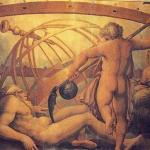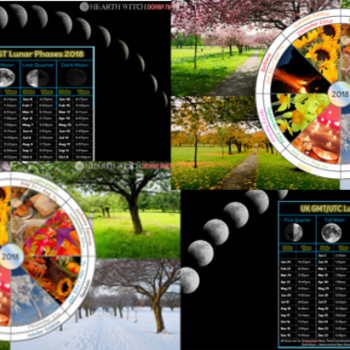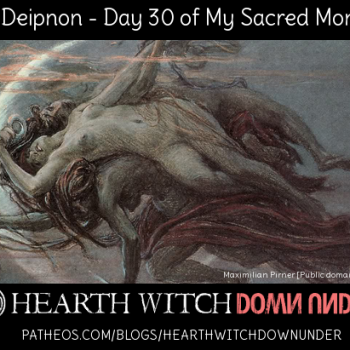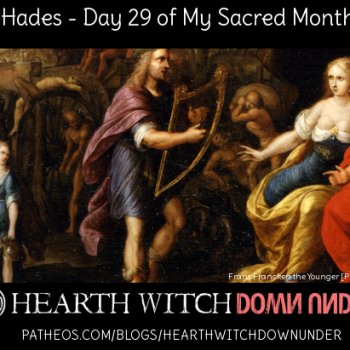Asteria is, like so many of the Titans, not well known to the average Pagan. There is a bit of information about Her around, but most of it is more about other deities and the role She played in Their stories, rather than information about Her on Her own behalf. This can make it difficult to really know anything about Her, without direct connection to Her – and the fact we know of very little in the way of cultus to Her doesn’t help modern worship either.
Still we can take a look and learn a few things that may be of help.
Asteria the Titaness
Asteria is the daughter of the Titan Koios “The Inquiring” and Titaness Phoibe, Goddess of bright intellect. Her sister is Leto, the mother of Artemis and Apollon. Asteria Herself is the Goddess of the starry night, falling stars and night time divination such as astrology and dreams. Her name is translated as “starry” or “falling star”. She is the wife of the Titan Perses, the Destroyer and with Him She had one child – Hekate, most honoured by Zeus.
There isn’t much information that I can find regarding Asteria in the early myths, before the Titanomachy and the rise of the Olympians. She did fight in the Gigantomachy with the other Gods, as evidenced by Her position on the Pergamon Altar (image below), though She is not mentioned by name in any texts about this war. Given the story that is told about Asteria after the Titanomachy, it seems safe to assume that She was not one of those who fought against Zeus. She was seemingly welcome on Olympus and while there unfortunately attracted the attention of Zeus.
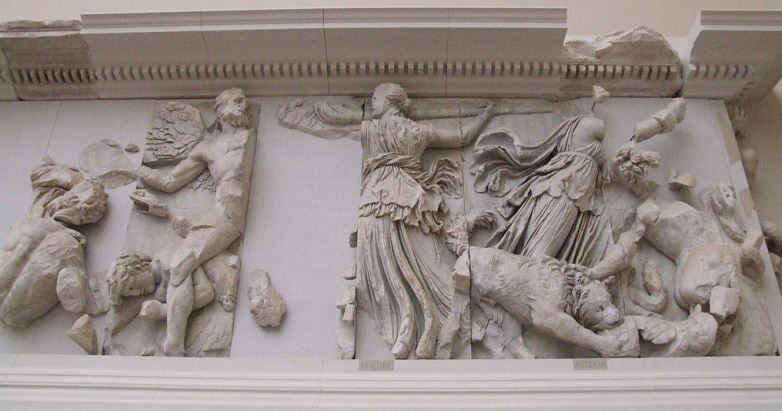
The Island of Delos
In order to escape the attention of Zeus, Asteria transformed Herself into a quail, but Zeus transformed into an eagle and caught Her. To get away She threw Herself into the sea, where Poseidon decided to chase Her as well until finally She turned Herself into an island. Some versions of the myth, such as in Fabulae by Pseudo-Hyginus, tell that when She turned Zeus down He punished Her by turning Her into a quail and throwing Her into the sea, and from this She became an island.
The island that Asteria became has held a few different names, most notably Asteria and Ortygia (which can translate as Quail Island) and the final and current name, Delos.
“Of the daughters of Coeus, Asteria in the likeness of a quail flung herself into the sea in order to escape the amorous advances of Zeus, and a city was formerly called after her Asteria, but afterwards it was named Delos. ” – Apollodorus the library (Bibliotheca) v1
The Birth of the Twins
Asterias sister, Leto, had some drama and was chased around the world as well, again because of Zeus. In this case, Leto was actually pregnant to Zeus and it was an angry Hera who pursued Her all around. Leto was in need of a place to stop so She could give birth, but no place was safe, no place would welcome Her in the face of Heras wrath. Except one – the island of Delos.
Asteria, as Delos, agreed to allow Leto to give birth on Her soil in exchange for a promise that Letos soon to be born son would create a great temple on Her soil. The agreement was struck, sworn by the Styx Herself, and Leto then gave birth to Artemis (though some myths state Artemis was born on a nearby islet). Artemis then of course helped Her mother birth the God Apollon, who did indeed set up a great temple on Delian soil.
“And Leto sware the great oath of the gods: ‘Now hear this, Earth and wide Heaven above, and dropping water of Styx (this is the strongest and most awful oath for the blessed gods), surely Phoebus shall have here his fragrant altar and precinct, and you he shall honour above all.’ Now when Leto had sworn and ended her oath, Delos was very glad at the birth of the far-shooting lord. ” – Hymn to Delian Apollon, The Homeric Hymns.
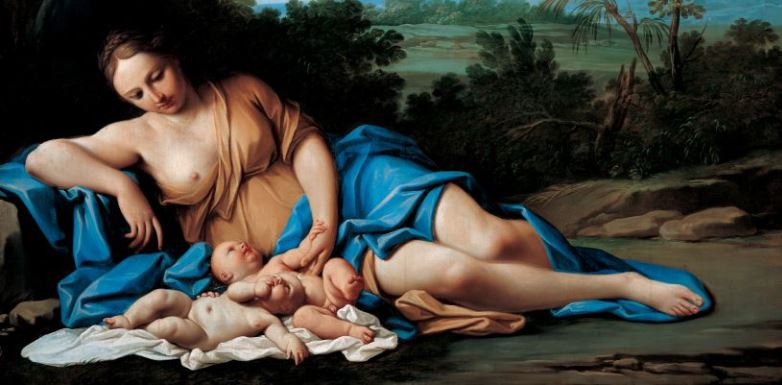
Miscellaneous
Asteria is sometimes conflated (or confused) with Nyx, which stands to reason – Nyx is the Night, Asteria is the Starry Night. Nyx is even listed as the mother of Hekate in some myths (Bacchylides and Apollonius Rhodius).
Theoi.com note that Asteria was perhaps worshipped under the name of Brizo (Slumber) on Delos itself, as a Goddess of dream oracles. She may also have been known as, the same as, or very similar to the Pasiphae of Thalamae, a Goddess of sky and ocean who sent prophetic dreams. Also She may have been conflated with the Mesopotamian Goddess Ishtar.
The island of Delos plays a role in many myths and stories from ancient Greece, but most of these fail to mention Asteria, or that Delos is a living island. Delos was, when Asteria first became the island, a floating island that had no fixed position. It was after the birth of Apollon that the island found a stable place on the Earth.
Callimachus, in his Hymn to Delos calls Her, “Asteria, lover of song” and “Nurse of Apollon”. He also refers to Her as the “Island of Incense”.
The symbols of Asteria are stars, falling stars (I would assume all sorts of meteors, comets etc), and quails – the image of an eagle grasping a quail would probably also be quite symbolic.
Thoughts on Asteria
One of the more interesting things about Asteria and Her history, is pointed out on Theoi.com: She and Her sister Leto appear to be two sides of the same coin. They both have children who are very similar and yet very different. Apollon is a God of light and day time prophecy, whereas Hekate while a light Goddess is also a night time Goddess and of night time magic and prophecy like Her mother. In essence, Leto births the day and Asteria births the night.
Leto also births Artemis who is often conflated with Hekate, which creates a further interesting connection between Asteria and Her daughter (or between Hekate and Artemis).
I also find it fascinating that Asteria is the wife of Perses the Destroyer. She is literally called, Asteria of happy name in the Homeric Hymns, and yet She is married to what could be deemed one of the more scary of the Hellenic Gods. But it makes a lot of sense as well, considering Their daughter is Hekate who is both dark and light, saviour and destroyer, Goddess of childbirth and of the dead. The seemingly opposing personalities of Asteria and Perses are well borne out in Their daughter.
My Worship of Asteria
As I began this post, there is very little in the way of information about Asteria other than Her status as Hekates mother and Her transformation into the island of Delos. This means that there is basically nothing I can find that tells us about Her cultus, Her worship, Her rituals, Her sacred days and festivals (if there were any). I cannot even find a good hymn, other than the ones to the island of Delos and to Delian Apollon – but those are not what I am after.
Despite Her status as a literal island on our planet, She is still the Starry Night and that is how I see Her and feel Her. I am not sure how to connect to an island on the other side of the world. But every time I go outside at night and view the stars, She fills my head and heart and I will always say a little something – generally a basic “Hail Asteria” or something similar.
I am not sure of other peoples opinions on this subject but when it comes to seeing the Gods by domain (earth, sky, ocean) I can’t help but see that Asteria is surely all three, just like Her daughter is. As the starry night, She is obviously a Ouranic deity, but as an island and one which used to float, She is surely also Oceanic and Cthonic.
On my own calendar I now honour Asteria every lunar month, on around the 19th day after the new waxing moon, but more precisely the 4th day after the full moon. According to Works and Days the 19th day (or the 9th of mid-month) improves the closer it gets to night, and so I thought it fitting for a night time Goddess (I also do a ritual to Nyx on this night). They didn’t disagree at all, even through divination, but this may be different for other people.
My rituals are fairly simple, involving a hymn to Asteria (and to Nyx), the burning of incense and a candle and of course a libation. This is all done outside, where possible, since it’s all about Goddesses of the night and should include views of the night sky.
A Hymn to Asteria
As I have said, I haven’t been able to find a hymn to Asteria so, I made a horrible attempt at one myself.
Hail Asteria of happy name,
Of Ortygian and Delian fame;
Goddess of the starry night,
mother of the bringer of light;
Birthplace, saviour, transformed one,
Nurse of your sisters gloried son;
Island drifting with ocean tides,
Bring us dreams, of all that hides;
Attend our rites, heed our pleas,
Help us view what no one sees.
Sources, Resources and Further Reading
- Homeric Hymns
- Hesiod, Theogony
- Theoi.com
- Ovid, Metamorphoses
- Apollodorus, The Library (Bibliotheca) v1
- Hesiod, Works and Days
- Callimachus, Hymn to Delos

